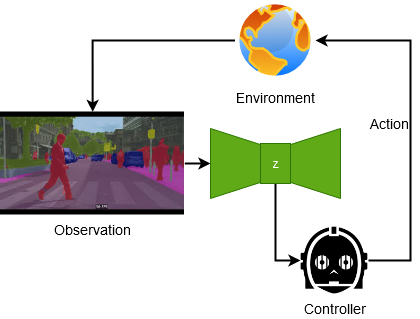Seminar: Robot Learning
Prof. Dr. Abhinav Valada
Co-Organizers:
Nikhil Gosala Daniel Honerkamp Juana Valeria Hurtado Dr. Daniele Cattaneo Dr. Tim Welschehold Eugenio Chisari
Deep learning has become a key enabler of real world autonomous systems. Due to the significant advancement in deep learning, these systems are able to learn various tasks end-to-end, including for perception, state estimation, and control, thereby making important progress in object manipulation, scene understanding, visual recognition, object tracking, and learning-based control, amongst others. In this seminar, we will study a selection of state-of-the-art works that propose deep learning techniques for tackling various challenges in autonomous systems. In particular, we will analyze contributions in architecture design, and techniques selection that also include computer vision, reinforcement learning, imitation learning, and self supervised learning.

Course Information
|
Details:
|
Course Number: 11LE13S-7316-MB
Places: 12
Zoom Session Details:
Passcode: roblearn21
|
|
Course Program:
|
Introduction: 23/04/2021 @ 14:00
How to make a presentation: 25/06/2021 @ 14:00
|
|
Evaluation Program:
|
Abstract Due Date: 18/06/2021
Seminar Presentation: 16/07/2021
Summary Due Date: 30/07/2021
|
|
Requirements:
|
Basic knowledge of Deep Learning or Reinforcement Learning
|
|
Remarks:
|
Due to the Corona crisis, the entire seminar will be held online.
Topics will be assigned for the seminar via a preference voting. If there are more interested students than places, places will be assigned based on priority suggestions of the HisInOne system and motivation (tested by asking for a short summary of the preferred paper). The date of registration is irrelevant. In particular, we want to avoid that students grab a topic and then leave the seminar. Please have a coarse look at all available papers to make an informed decision before you commit.
|
Course Material
|
Slides:
|
Lecture 1: Introduction
Lecture 2: How to Make a Good Presentation
|
|
Recordings:
|
Lecture 1: Introduction (Passcode: 3kB@g45EV) - Valid Till: 22/05/2021
Lecture 2: How to Make a Good Presentation (Passcode: zNDw2uel=) - Valid Till: 23/07/2021
|
|
Templates:
|
Additional Information
Enrollment Procedure
- Enroll through HISinOne, the course number is 11LE13S-7316-MB.
- The registration period for the seminars are from 19/04/2021 to 28/04/2021.
- Attend the introductory session on 23/04/2021 via Zoom (Session details have been provided above).
- Select three papers from the topic list (see below) and complete this form by 28/04/2021.
- Places will be assigned based on priority suggestions of HISInOne and motivation of the student on 29/04/2021.
Evaluation Details
- Students are expected to write an abstract, prepare a 20-minute long presentation and draft a summary.
- The abstract should not exceed two pages and is due on 18/06/2021.
- The seminar will be held as a virtual "Blockseminar" on 16/07/2021.
- The slides of your presentation should be discussed with the supervisor two weeks before the Blockseminar.
- The summary should not exceed seven pages (excluding bibliography and images) and is due on 30/07/2021. Significantly longer summaries will not be accepted.
- Ensure you cite all work you use including images and illustrations. Where possible, try to use your own illustrations.
- The final grade is based on the oral presentation, the written abstract, the summary, and participation in the blockseminar.
What should the Summary contain?
The summary should address the following questions:
- What is the paper's main contribution and why is it important?
- How does it relate to other techniques in the literature?
- What are the strengths and weaknesses of the paper?
- What would be some interesting follow-up work? Can you suggest any possible improvements in the proposed methods? Are there any further interesting applications that the authors might have overlooked?
Graded Component Submission
- Save your document as a PDF and directly submit it to your topic supervisor via email.
- The filename should be in the format "FirstName_LastName_X.pdf" where X is the evaluation component (Abstract / Summary / Presentation).
Topics
- Perceive, Attend, and Drive: Learning Spatial Attention for Safe Self-Driving
Supervisor: Nikhil Gosala - Orthographic Feature Transform for Monocular 3D Object Detection
Supervisor: Nikhil Gosala - Neural Scene Graphs for Dynamic Scenes
Supervisor: Juana Valeria Hurtado - Semantic Object Prediction and Spatial Sound Super-Resolution with Binaural Sounds
Supervisor: Juana Valeria Hurtado - xMUDA: Cross-Modal Unsupervised Domain Adaptation for 3D Semantic Segmentation
Supervisor: Dr. Daniele Cattaneo - STaR: Self-supervised Tracking and Reconstruction of Rigid Objects in Motion with Neural Rendering
Supervisor: Dr. Daniele Cattaneo - Self-Supervised Correspondence in Visuomotor Policy Learning
Supervisor: Eugenio Chisari - Accelerating Reinforcement Learning with Learned Skill Priors
Supervisor: Eugenio Chisari - Asymmetric Self-Play for Automatic Goal Discovery in Robotic Manipulation
Supervisor: Daniel Honerkamp - Language as a Cognitive Tool to Imagine Goals in Curiosity-Driven Exploration
Supervisor: Daniel Honerkamp - Reinforcement Learning with Videos: Combining Offline Observations with Interaction
Supervisor: Dr. Tim Welschehold - A GMM Layer Jointly Optimized with Discriminative Features within a Deep Neural Network Architecture
Supervisor: Dr. Tim Welschehold
Questions?
If you have any questions, please direct them to Nikhil Gosala before the topic allotment, and to your supervisor after you have received your topic.

